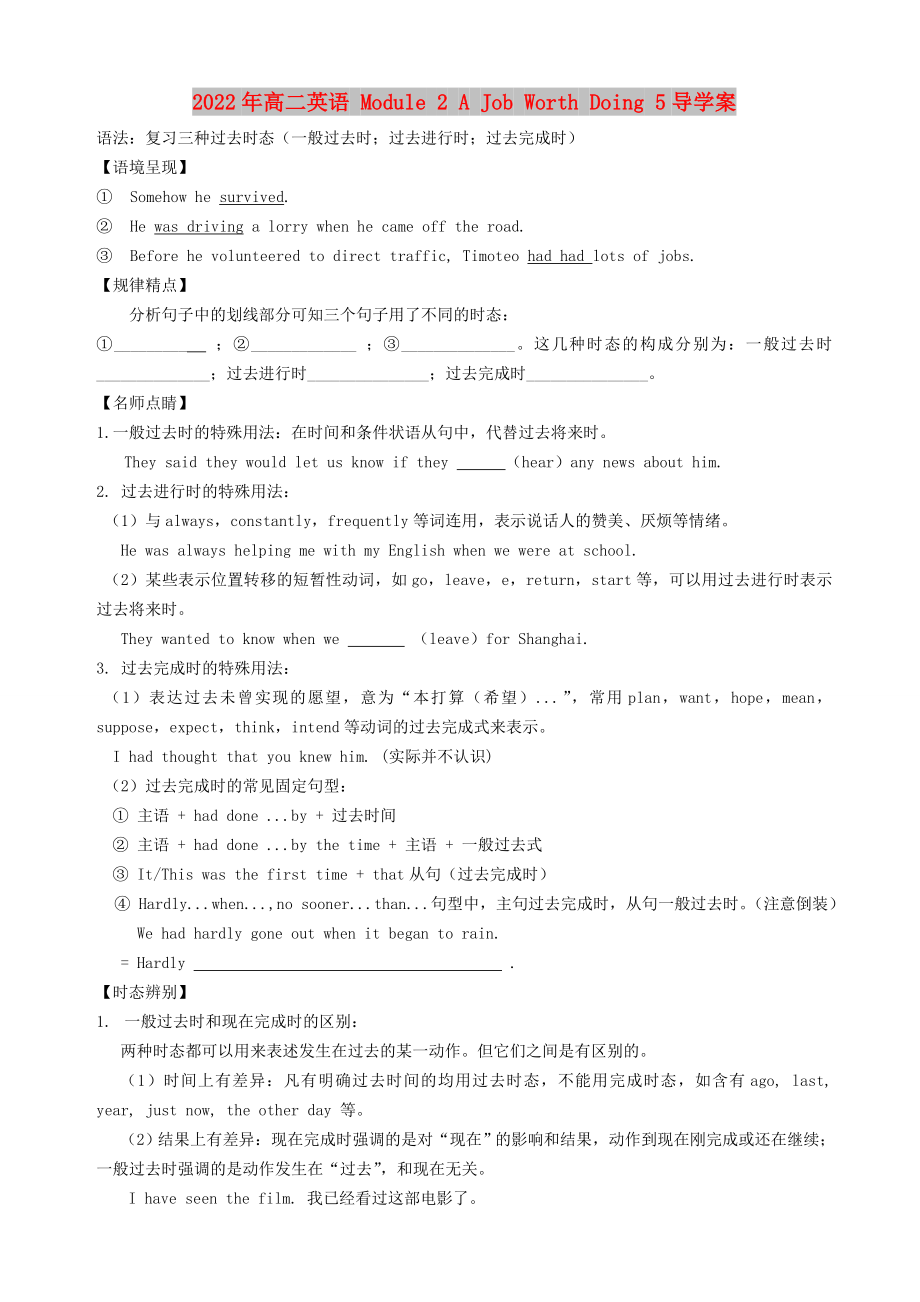《2022年高二英語 Module 2 A Job Worth Doing 5導(dǎo)學(xué)案》由會員分享�,可在線閱讀,更多相關(guān)《2022年高二英語 Module 2 A Job Worth Doing 5導(dǎo)學(xué)案(2頁珍藏版)》請在裝配圖網(wǎng)上搜索���。
1����、2022年高二英語 Module 2 A Job Worth Doing 5導(dǎo)學(xué)案
語法:復(fù)習(xí)三種過去時態(tài)(一般過去時;過去進(jìn)行時�;過去完成時)
【語境呈現(xiàn)】
① Somehow he survived.
② He was driving a lorry when he came off the road.
③ Before he volunteered to direct traffic, Timoteo had had lots of jobs.
【規(guī)律精點】
分析句子中的劃線部分可知三個句子用了不同的時態(tài):
①_________ ;②____________
2�、_ ;③______________����。這幾種時態(tài)的構(gòu)成分別為:一般過去時______________;過去進(jìn)行時_______________��;過去完成時_______________�。
【名師點睛】
1.一般過去時的特殊用法:在時間和條件狀語從句中,代替過去將來時��。
They said they would let us know if they (hear)any news about him.
2. 過去進(jìn)行時的特殊用法:
(1)與always����,constantly,frequently等詞連用��,表示說話人的贊美��、厭煩等情緒��。
He was always
3��、helping me with my English when we were at school.
(2)某些表示位置轉(zhuǎn)移的短暫性動詞,如go�����,leave�����,e��,return��,start等�,可以用過去進(jìn)行時表示過去將來時��。
They wanted to know when we (leave)for Shanghai.
3. 過去完成時的特殊用法:
(1)表達(dá)過去未曾實現(xiàn)的愿望��,意為“本打算(希望)...”���,常用plan�,want�����,hope,mean�����,suppose�,expect,think�,intend等動詞的過去完成式來表示。
I had though
4���、t that you knew him. (實際并不認(rèn)識)
(2)過去完成時的常見固定句型:
① 主語 + had done ...by + 過去時間
② 主語 + had done ...by the time + 主語 + 一般過去式
③ It/This was the first time + that從句(過去完成時)
④ Hardly...when...,no sooner...than...句型中�,主句過去完成時����,從句一般過去時。(注意倒裝)
We had hardly gone out when it began to rain.
=
5�����、Hardly .
【時態(tài)辨別】
1. 一般過去時和現(xiàn)在完成時的區(qū)別:
兩種時態(tài)都可以用來表述發(fā)生在過去的某一動作�。但它們之間是有區(qū)別的。
(1)時間上有差異:凡有明確過去時間的均用過去時態(tài)���,不能用完成時態(tài)���,如含有ago, last, year, just now, the other day 等�。
(2)結(jié)果上有差異:現(xiàn)在完成時強(qiáng)調(diào)的是對“現(xiàn)在”的影響和結(jié)果�����,動作到現(xiàn)在剛完成或還在繼續(xù)�����;一般過去時強(qiáng)調(diào)的是動作發(fā)生在“過去”��,和現(xiàn)在無關(guān)���。
I have seen the film. 我已經(jīng)看過這部電影了。
6�、
(表示我現(xiàn)在了解這部電影的內(nèi)容)
I saw the film last week. 上周我看了這部電影。
(只說明我上周看了這部電影)
2. 過去進(jìn)行時和一般過去時的區(qū)別:
兩者的基本區(qū)別是過去進(jìn)行時通常表示一個過去正在進(jìn)行且尚未完成的動作����,而一般過去時則通常表示一個過去已經(jīng)完成的動作。如:
I was reading a book last night. 我昨晚在看書��。(不一定看完)
I read a book last night. 我昨晚看了一本書。 (已經(jīng)看完)
【走進(jìn)高考】
1. When I got on the bus���,I I had left my wallet at home.
A. was realizing B. realized C. have realized D. would realize
2. By the time Jack returned home from England���,his son from college.
A. graduated B. has graduated
C. has been graduating D. had graduated
 2022年高二英語 Module 2 A Job Worth Doing 5導(dǎo)學(xué)案
2022年高二英語 Module 2 A Job Worth Doing 5導(dǎo)學(xué)案

